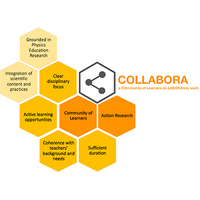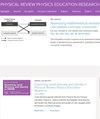合作物理教师:通过学习者社区的行动研究,加强实验室的使用
IF 2.6
2区 教育学
Q1 EDUCATION & EDUCATIONAL RESEARCH
Physical Review Physics Education Research
Pub Date : 2023-11-29
DOI:10.1103/physrevphyseducres.19.020162
引用次数: 0
摘要
本研究对学习者群体在物理教师专业发展中的作用的文献有所贡献。它提供了来自collaboration - a学习者社区实验室工作计划的见解,旨在加强中学物理教学中实验室的使用。该计划的基础建立在两个支柱上:学习社区方法和行动研究,以物理教育研究的结果为基础。此外,该计划的结构包含了文献中概述的有效专业发展的核心特征(内容重点,主动学习机会,与教师需求的一致性,以及足够的持续时间)。这个项目持续了2年。在第一年,教师参与和讨论不同类型的实验,反思科学实践的评估,并参与旨在改善课堂实验室活动的行动研究。第二年,他们专注于将实验室工作整合到通过逆向设计过程开发的教与学序列中。本研究的研究问题集中在检查项目特征的作用和相关性上,特别强调学习社区和行动研究的组成部分,以及调查教师因参与项目而报告的变化。研究结果强调了教师群体的关键作用,互惠培训被认为是“真正的发展”因素。此外,它们证实了行动研究在培养以研究为基础的创新的所有权意识方面的相关性。在整个项目过程中,老师们报告了个人领域、实践领域的变化,特别是在第二年,学生成绩也发生了变化。这些变化包括使用不同类型的实验,在实验室中有更强的自我效能感,以及更加注重实验室工作的设计和评估。我们通过“成长”的视角来研究变化,既在群体层面上,也在个别案例研究的子集内。后一种分析强调了教师成长的不同可能的生产性途径,支持了教师专业发展是复杂和多方面的观点。方案结构促进了“制定”和“反思”的过程,调解了各种变化。本文章由计算机程序翻译,如有差异,请以英文原文为准。

Collaborative physics teachers: Enhancing the use of the laboratory through action research in a community of learners
This study contributes to the literature on the role of communities of learners in the professional development of physics teachers. It offers insights from the Collabora—A Community of Learners on Laboratory Work program, designed to enhance the use of laboratories in secondary school physics teaching. The program’s foundation rested upon two pillars: a learning community approach and action research, grounded in the findings of physics education research. Furthermore, the program was structured to encompass the core features of effective professional development as outlined in the literature (content focus, active learning opportunities, coherence with teachers’ needs, and sufficient duration). The program spanned 2 years. During the first year, teachers engaged with and discussed different types of experiments, reflected on the assessment of scientific practices, and participated in action research aimed at improving laboratory activities in their classrooms. In the second year, they focused on integrating laboratory work within teaching-learning sequences developed through a backward design process. The research questions of this study were centered on examining the role and relevance of program features, with particular emphasis on the learning community and action research components, and on investigating the changes reported by teachers as a result of participating in the program. The findings emphasize the pivotal role of the teacher community, with reciprocal training identified as the “truly developmental” element. Moreover, they corroborate the relevance of action research in fostering a sense of ownership of research-based innovations. Over the course of the program, teachers reported changes in the personal domain, in the domain of practice, and, particularly in the second year, also in the domain of student outcomes. These changes included the use of different types of experiments, a greater sense of self-efficacy in the laboratory, and an increased focus on the design and assessment of laboratory work. We studied changes through a “growth” lens, both at the group level and within a subset of individual case studies. The latter analysis highlights different possible productive pathways to teachers’ growth, supporting a view of teacher professional development as complex and multifaceted. The program structure facilitated the processes of “enactment” and “reflection” that mediated the various changes.
求助全文
通过发布文献求助,成功后即可免费获取论文全文。
去求助
来源期刊

Physical Review Physics Education Research
Social Sciences-Education
CiteScore
5.70
自引率
41.90%
发文量
84
审稿时长
32 weeks
期刊介绍:
PRPER covers all educational levels, from elementary through graduate education. All topics in experimental and theoretical physics education research are accepted, including, but not limited to:
Educational policy
Instructional strategies, and materials development
Research methodology
Epistemology, attitudes, and beliefs
Learning environment
Scientific reasoning and problem solving
Diversity and inclusion
Learning theory
Student participation
Faculty and teacher professional development
 求助内容:
求助内容: 应助结果提醒方式:
应助结果提醒方式:


